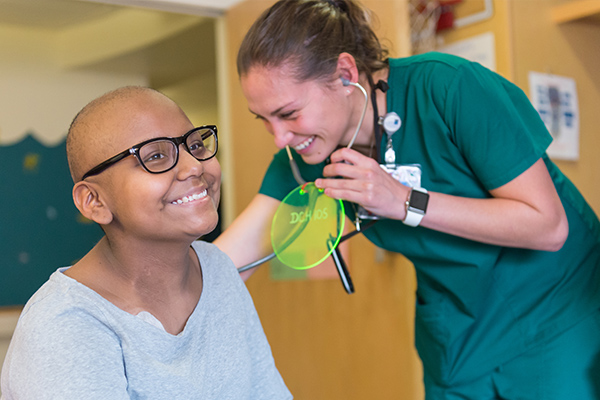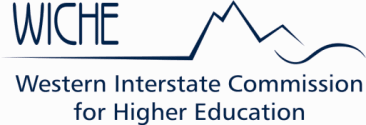Pediatric Primary & Acute Nurse Practitioner (PNP)

Our D.N.P. Pediatric Nurse Primary & Acute Practitioner program features:
- An integrated curriculum that prepares graduates for both primary and acute care certification.
- Interprofessional and student-centered education with practicing nurse practitioner faculty.
- Clinical partnerships with two local high-ranking children's hospitals.
- 100% pass rate for certification (2023)
Program description
The Doctor of Nursing Practice (D.N.P.) Pediatric Primary & Acute Nurse Practitioner (PNP) Program is designed to prepare advanced practice registered nurses to deliver primary and acute care to children (birth to 21 years of age) across practice settings and institutional boundaries.
The overall objective of the D.N.P.-PNP Program is to provide the foundation and scaffolding for students to become competent and caring pediatric nurse practitioners, scholars, and leaders. The program includes both didactic and clinical courses, beginning with foundational coursework and advancing to specialized clinical applications. In addition to providing direct care to children, graduates are prepared as lifelong learners, leaders, and advocates for children and their families.
Portland based
The D.N.P.-PNP program is a Portland-based hybrid program. Students work closely with faculty and must participate in 1:1 annual reviews with the PNP Program Director. Students are expected to come ready and open to learning with/from faculty, clinical preceptors, peers, and the children and families they are privileged to care for.
Dual preparation
All students will be prepared to be certified as both primary care (PC) and acute care (AC). The scope of practice for the PNP-PC- or PNP-AC is not setting specific, but instead is based on the child's health-related needs:
Primary Care (PC) Emphasis: The PNP-PC practices wherever pediatric patients are in need of primary care. The focus for the PNP-PC is an ongoing relationship with the child and family in the delivery of comprehensive health care and coordination of health services. Accordingly, course work concentrates on foundational knowledge of child growth and development, health promotion and disease prevention behaviors and interventions, and common acute/chronic illnesses and/or conditions.
Acute Care (AC) Emphasis: The focus for the PNP-AC is the delivery of restorative care, characterized by rapidly changing clinical conditions. The PNP-AC practices in acute care settings, such as intensive care units (ICU) or Emergency Departments;however they may also practice wherever pediatric patients are acutely ill, physiologically unstable, technologically dependent, and/or vulnerable to complications.
Coursework
Students will begin with foundational coursework in advanced pathophysiology, advanced pharmacology, and advanced health assessment. The curriculum builds on this foundation adding advanced didactic pediatric coursework and exposing students to varied clinical rotations through pediatric primary, acute, specialty, and/or chronic care clinical sites.
The program was developed for full-time study. Students opting for part time may have to wait until specific courses are offered, as coursework is offered using a specific sequence and only once each year.
D.N.P. student learning outcomes (applies to all post-master’s D.N.P. and all APRN specialties)
- Demonstrate readiness to enter clinical practice via specialty competencies with the appropriate scientific knowledge, and considerations for its application to practice.
- Apply ethical principles along with the standards of professional conduct to clinical care, research, and education.
- Evaluate emerging healthcare systems and policy that influence delivery of cost effective patient care.
- Generate entry level practice scholarship through the completion of a clinical practice improvement project based on the principles of improvement science.
- Model interprofessional communication and collaboration to improve individual and/or population health outcomes.
- Identify and address gaps in professional knowledge through ongoing reflection to support the principle of life-long learning.
Pediatric Acute and Primary Care Nurse Practitioner student learning outcomes
- Demonstrate safe care of children and their families in primary and acute care settings.
- Provide individualized, culturally sensitive management using quality improvement strategies where applicable.
- Use effective communication skills and technologies to provide collaborative care.
- Integrate professional leadership skills in delivery of care.
- Synthesize and translate relevant, current and scientific knowledge and evidence based research findings into practice.
- Employ advocacy strategies to influence health care policy.

For all program specifics, Student Learning Outcomes and detailed school information, check out the School of Nursing Catalog/Student Handbook.

Contact us about this program today!
We're here to answer any questions you have about the OHSU School of Nursing.
Scholarships available
OHSU offers a variety of scholarships that can help fund your education.

Don’t live in Oregon?
You may qualify for in-state tuition through the Western Regional Graduate Program.